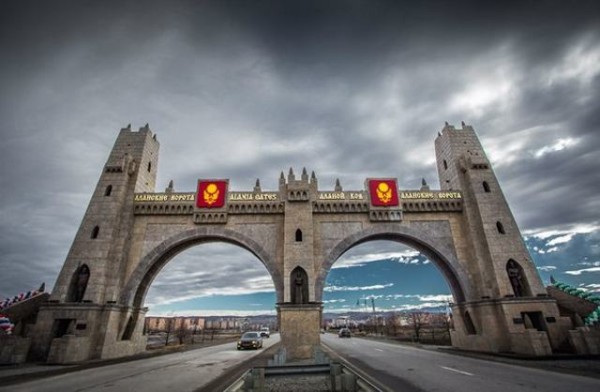
Competition Over Ethnic Titles and History Unfolds in the North Caucasus
Publication: Eurasia Daily Monitor Volume: 13 Issue: 21
By:

A new type of conflict is brewing between Ingushetia and North Ossetia. This time it is over the historical legacies of the Ingushetian and Ossetian people. In December, the government of Ingushetia erected the “Alania Gates” in the republican capital Magas. Speaking at the inaugural ceremony, Ingushetia’s governor, Yunus-Bek Yevkurov, said that the arch symbolized “the ancient and heroic history of Ingushetia” (Ingushetia.ru, December 19, 2015).
The opening of the “Alania Gates” in Ingushetia, however, did not go over well in neighboring North Ossetia. Ossetians accused the initiators of the Alania Gates of “stealing Ossetian history.” The well-known North Ossetian historian Ruslan Bzarov called the opening of the Alania Gates in Ingushetia an “ideological provocation,” adding: “Unfortunately, this public relations project has nothing to do with history, and cannot. We are observing an improper and unscrupulous use of somebody else’s brand by the neighboring republic.” Responding to the numerous inquiries by republican residents, the deputy spokesman of the North Ossetian parliament, Stanislav Kesaev, said Ingushetia, as a neighboring republic, could build any object and call it anything it wanted (Gradus.pro, January 25).
Ossetians started to claim Alans as their ancestors after 19th century Russian and Western scholars made a connection between them. Persian and Roman sources referred to Alans in the 1st century CE, but the Alans themselves did not leave much written evidence. Since they were somewhat warlike and known to ancient authors, several North Caucasian ethnic groups have been eagerly contesting the Alans’ historical legacy. The well-known Darial Gorge, for example is traced back to the Persian Dar-e Alan, which means “Gate of the Alans.” In addition to the Ingush, the ethnic Karachays and Balkars also claim they derive from the Alans. In a way this resembles the ongoing dispute between Greece and modern day Macedonia, as Greece does not recognize Macedonia’s right to call itself by that name.
Ossetians tend to be especially offended when the neighboring Ingush assume the name of Alans, because of the years-long competition and conflict between the two republics. Back in 1992, North Ossetia and Ingushetia engaged in actual armed clashes that left hundreds of people dead and thousands of homes destroyed. Some Ingushetian residents of North Ossetia never managed to return to their homes after they fled the violence or were driven out. Even though the conflict between the Ossetians and the Ingush is officially over, tensions between the two people remain high, and the symbolic act of the inauguration of the Alania Gates in Ingushetia reignited them surprisingly quickly. Ossetian historian Ruslan Bzarov even discerned a conspiracy of anti-Russian forces who want to spark a conflict between the North Caucasian ethnic groups. Ingush historians, however, convincingly argue that the ancient Alans were a multi-ethnic group that also included the Ingush. Historian Magomed Gandarov says that after the Russian conquest of the North Caucasus, the Tsarist political leadership defined the study of history. According to Gandarov, since Russia identified Ossetians as their regional allies, the Russian authorities “awarded” the Alan historical legacy to the Ossetians (Ekhokavkaza.com, January 29).
The Ingushetian people’s search for an identity is another important part of the problem. The Ingushetian government may especially appreciate the adoption of the Alans as their ancestors to differentiate themselves from the Chechens. The Chechens and Ingushetians speak closely related languages, and many Ingush have suspected Ramzan Kadyrov of encroaching on their republic and identity as well as wishing to incorporate Ingushetia into Chechnya. Thus, by establishing a separate identity that cannot be reduced to “cousins of Chechens,” the Ingush government affirms the right to have their own republic rather than be merged back into Checheno-Ingushetia.
Meanwhile, some Ossetians, feeling the urgency of competition over history and ancestry, have started to lobby for an official change of the name of the republic and the ethnic group as a whole. Ruslan Bzarov argues that ethnic name “Ossetian” was only taken as official for political reasons at the time of the Russian conquest of the Caucasus in the 19th century. In fact, it is a Russified version of the Georgian name for the Ossetians, says the Ossetian historian (osradio.ru, January 25). The governor of North Ossetia, Tamerlan Aguzarov, has also quite harshly spoken against the initiative in Ingushetia, thus the renaming of the republic may actually happen.
Apart from reigniting Ossetian-Ingush tensions, the dispute between the Ossetians and the Ingush over historical legacies affects the situation in the breakaway Georgian region of South Ossetia. North Ossetia officially adopted the double name the Republic of North Ossetia–Alania back in 1994. Whereas, South Ossetia’s name still includes no reference to Alania. South Ossetia’s leader, Leonid Tibilov, has recently said he was ready to rename the republic South Ossetia–Alania (TASS, December 28, 2015). With the newest trend in North Ossetia, however, he might delay his decision for some time.
It is unclear what Moscow’s position on changing the names will be. On the one hand, the Russian government may be interested in synchronizing the names of South Ossetia and North Ossetia to exert greater pressure on Georgia, as the latter does not recognize South Ossetia as an independent state. On the other hand, Moscow may be wary of fueling Ossetian nationalism. All the republics in the Russian Federation that managed to change their titles to reflect their non-Russian origin, such as Tatarstan, Bashkortostan and North Ossetia, did so in the 1990s, when the central government in Moscow was relatively weak. Under Putin, Moscow is much more zealous about titles and symbols, trying to unite the around ethnic-Russian nationalism. With the struggle for historical legacies unfolding in the North Caucasus, Moscow will have to react, one way or the other, to the increasingly intense regional demands.




